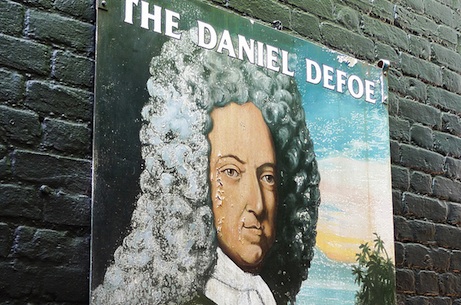
Marc Mierowsky is researching how 18th century writers used literature as a vehicle for ideas on political sovereignty.
How important is literature to the popularisation of political ideas?
In the 18th century, literature was probably the most important popular vehicle of ideas. Despite the audience for plays being less diverse than in Shakespearean times, plays offered a philosophical battlefield for writers.
Marc Mierowsky [2011] is researching how ideas of political sovereignty were transmitted through literature.
“I am interested in how people understand their place in society,” he says, “and what intermediary role literature plays in popularising this and creating a public of readers and voters. The 18th century is the age when the public sphere was created and I am studying how ideas about the political agency of people are enacted and promoted in literature.”
Marc is South African and was born in Johannesburg.
His family moved to Sydney when he was five due to fears about violence in South Africa, but travelled back often for holidays.
Marc was an early reader and found comfort in reading. He says he always has a book with him. “Books helped me when I moved and gave me a second place to live,” he says.
Marc’s mother, a doctor, taught him to read before he went to school and his father, who is a software developer, used to read to him a lot when he was young and used to take great pleasure in reading Marc and his sister nonsense verse. “When I got to university and did a seminar on Victorian nonsense poetry I knew all the poems by heart because my dad had recited them to us,” he says.
His father, a keen mathematician, was drawn to the puzzles within nonsense rhyme and had a liking for the absurd.
Unlike his father and sister, Marc’s preferences were firmly rooted in literature. He says he even used to read a book in maths. His father tried to teach him the subject and he laughs that it almost ruined their relationship.
His favourite literature at high school and in his first years at university was 19th century novels. He also read a lot of African literature.
Marc won a scholarship and went straight to Sydney University after high school majoring in English and ancient history.
His English teacher at high school had recommended the University to him. She was “a huge influence”. She recognised his potential and encouraged him to work harder. She even took him to the university and showed him around. He laughs: “I blame her for everything. I could have been a tax attorney.”
For his honours year, he specialised in 18th century English. He had done a course on this before his honours and wrote an extended essay on Daniel Defoe. His course leader said that this could be developed into an honours topic. “It fell into my lap,” he says.
Memory
After his honours year he worked for six months as a research assistant. His supervisor was writing a book on the use of history in 18th century literature which will be published shortly. Marc’s focus was on the philosophy behind history and memory. He was also a tutor in Latin and history at a local high school and was doing a masters course in applied linguistics in the evenings at the University of New England. He chose linguistics because he already had an honours degree in English. It proved useful as he now teaches a Language and Literature course at Cambridge.
During his masters course, he applied abroad to do his PhD. He spoke to his supervisor at Cambridge who was very encouraging and Marc was keen to work alongside him. Initially, his PhD was focused on the history of propaganda and the publication of polemical literature in the 18th century, but it has since gravitated more towards the history of philosophy with a focus on how philosophical and political ideas are transmitted in popular literature.
Marc, who hopes to stay in academic research after his PhD, is particularly interested in how political satire operates in Restoration drama and is currently looking at how the prologues and epilogues of plays were used by playwrights and their supporters to voice political arguments about popular sovereignty. “They were a really important form of political debate,” he says. “Literature played a really central role in political ideas. Getting into the way people thought back then and trying to understand how the ideas might have been received then is a fascinating intellectual challenge.”
Picture credit: Creative Commons and Ewan-M.












